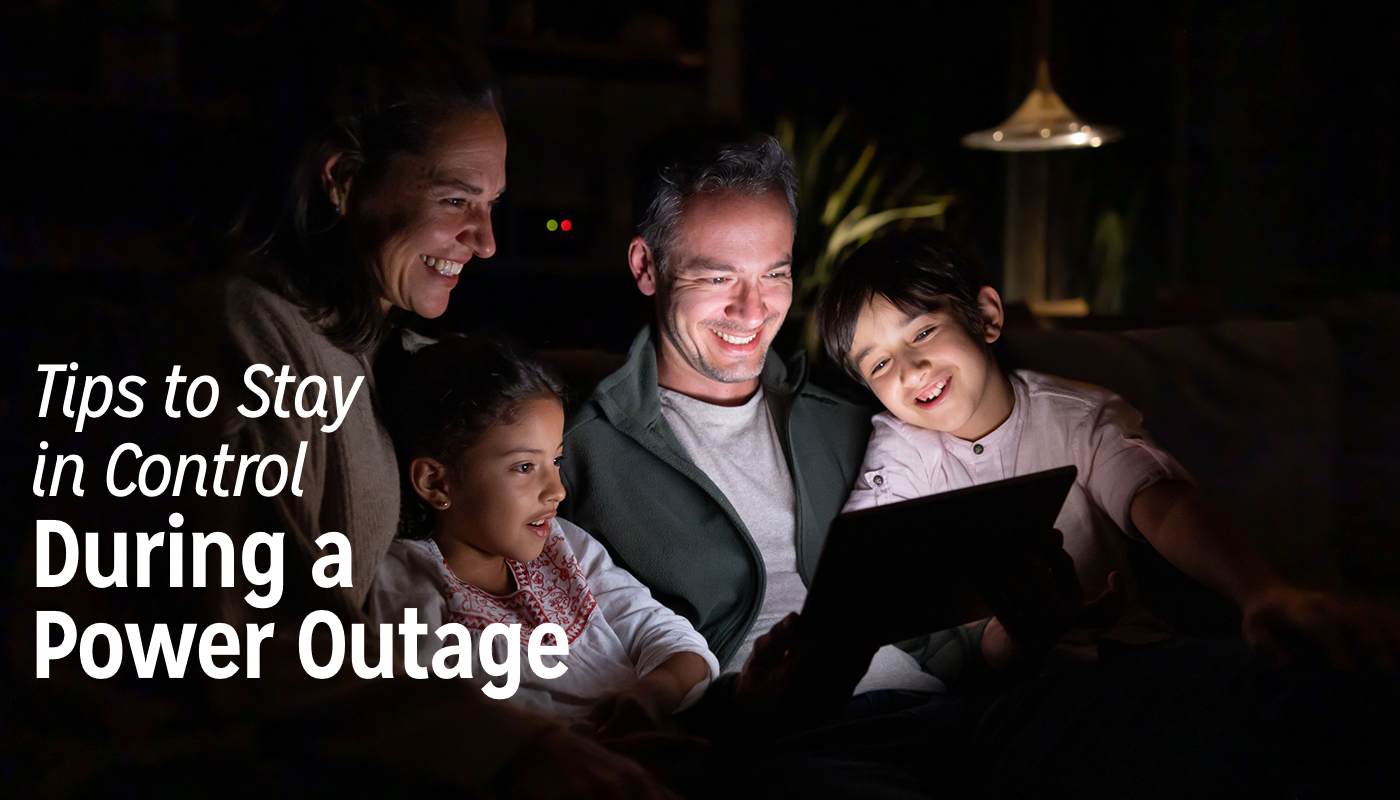To ensure you receive the best service possible,
please enter your zip code below:

Expect something more
Does your insurance provide enough protection if severe weather causes damage to your home? Talk with an agent to review your coverage.

Does your heart skip a beat when the lights flicker? Could you find your flashlight or your phone in the dark? And most importantly, do you know what to do during a power outage?
Power outages can be unsettling, especially when they happen without warning. But a little preparation goes a long way. With the right steps and supplies, you can stay safe, comfortable and informed—whether you’re facing a brief blackout or wondering how long power outages typically last in your area.
One of the best ways to help protect your family is through preparation—which starts with making a household emergency plan.
Designate a central contact person and decide where you’ll meet if you need to leave home due to a power outage. Ready.gov offers free emergency plan templates to help you get started.
If you live with older adults, children with medical needs, or pets, plan for backup medical supplies, ID tags and extra batteries for hearing aids or medical devices.
Not sure if your current home policy covers outage-related damage? Contact your insurance agent to review your coverage. You may want added protection for things like spoiled food, sump pump failures or temporary housing.
A plan is especially important if you’re wondering how to prepare for a long-term power outage due to storms, wildfires or a major infrastructure failure.
Whether you own your home or rent, having the right insurance is crucial to helping protect your investment and belongings. Our helpful guide can help you make an informed decision on selecting coverage that’s right for you.
Read moreTaking proactive steps before a storm hits can make a big difference in how well you weather a power outage. These steps can help reduce damage and keep your household safe.
Weatherproof your space
Prep your heating sources
Prep for warm weather
Check smoke and carbon monoxide detectors
Plumbing

Sometimes, only part of your home may lose power, or the lights dim instead of going out completely. These partial outages can signal electrical issues that could damage appliances or even cause fires. If this happens, unplug sensitive devices and call your electric utility company immediately.
If the lights are out, you might wonder how to check the status of a power outage in your area and who to contact. Most utility companies have outage maps, text alerts and mobile apps to track restoration times and report issues in your area.
Learn how to report a power outage in advance so you’re not scrambling when the lights go out. Bookmark your utility’s outage page or save their number in your phone.
Learn how to prepare your home and your family for an extreme weather event with our AAA Member-exclusive webcast “Insurance, Bad Weather, and You.”
Watch nowPower outages can last for a few hours or can go on for weeks, depending on the severity of the incident and your location. While downed lines due to storms and equipment failures are common culprits, causes of a power outage can include high electricity demand, accidents or infrastructure problems. That’s why it’s smart to stock your home with basic supplies before you need them.
Experts recommend keeping at least three days’ worth of food that doesn’t require refrigeration or cooking. Examples include:
When you’re planning to prepare for a long-term power outage, consider adding more variety and volume to your pantry, including powdered drink mixes, electrolyte packets and freeze-dried meals.

Keep at least one gallon of water per person per day, and more if you have pets, infants or medical needs. Consider freezing extra water bottles ahead of time to keep your freezer cold if the power goes out.
A full freezer can stay cold for about 48 hours (less if it’s not full), and a closed refrigerator can keep food safely cold for up to four hours. You can stretch that window with a bit of planning:
A common question is, “What should I throw out of the freezer after a power outage?” As a general rule, toss any perishable food that’s been above 40°F for more than two hours. The FDA has a food safety guide for outages, but when in doubt, throw it out.
Power outages can be both unpredictable and anticipated. Either way, preparation is the key to making it through safely and as comfortably as possible until the lights come back on.
Yes, they can indicate electrical issues that may damage appliances or cause fires. Unplug sensitive devices and contact your electric utility company immediately.
Experts recommend:
Expect something more
Does your insurance provide enough protection if severe weather causes damage to your home? Talk with an agent to review your coverage.
This information is being provided for general informational purposes only. The Auto Club Group does not assume any liability in connection with providing this information.
Coverage is subject to all policy terms, conditions, exclusions and limitations. Discounts and savings opportunities subject to eligibility requirements. Subject to underwriting requirements. Prices may vary based on how you buy insurance, subject to availability in your state. AAA Insurance is a collection of AAA branded insurance products, services, and programs made available to qualified members. Personal lines insurance is underwritten by Auto Club Insurance Association (IL Auto, IL Home, MI Home, MN Home), Auto Club Group Insurance Company (IA Auto, IA Home, IN Auto, IN Home, NE Auto, NE Home, WI Auto, WI Home), Auto Club Insurance Company of Florida (FL Package), Auto Club South Insurance Company (FL Auto), MemberSelect Insurance Company (GA Auto, GA Home, MI Auto, MN Auto, TN Auto, TN Home), The Members Insurance Company (NC Auto, NC Home), and Universal Insurance Company (NC Auto, NC Home, SC Auto, SC Home). Auto and Home Insurance provided by CSAA IG, a AAA Insurer. ©2025 The Auto Club Group. All rights reserved.